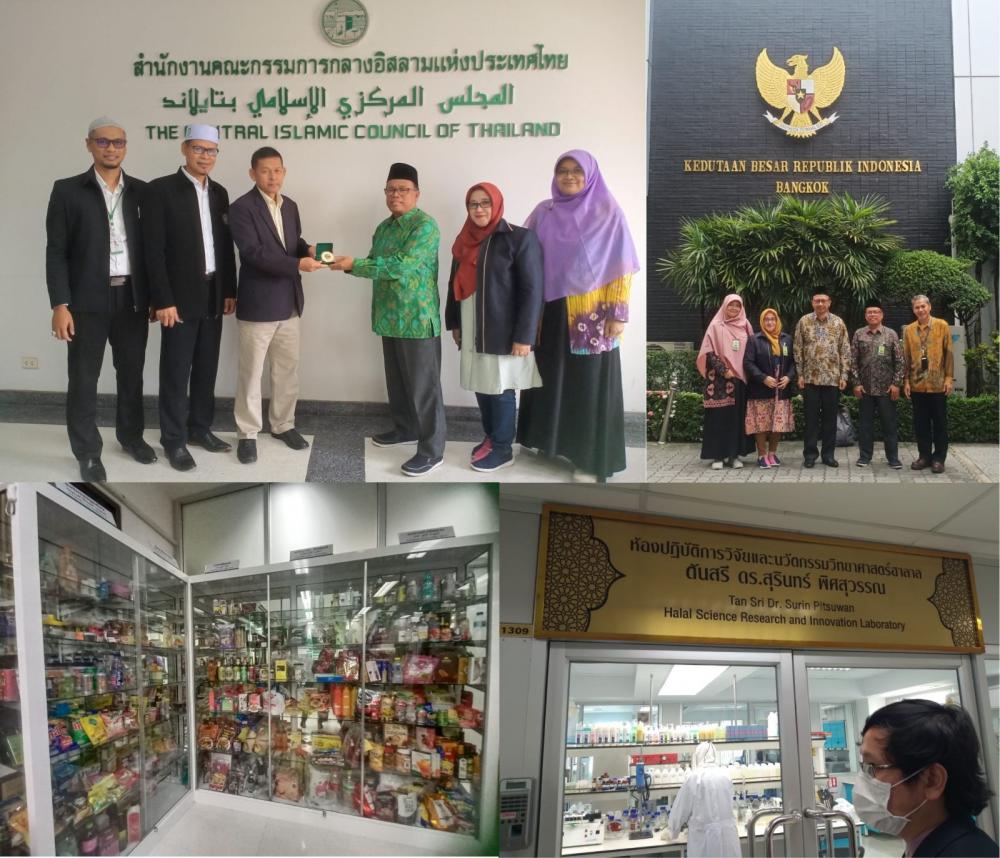Benchmarking LPH UIN Sunan Kalijaga to The Central Islamic Council of Thailand

In an effort to provide maximum service to the community, Halal Inspection Agency (LPH) UIN Sunan Kalijaga Yogyakarta conducted learning activities to several institutions in Thailand, on September 5-7, 2023. The study visit was led by the Head of LPH UIN Sunan Kalijaga Yogyakarta Prof. Dr. Ahmad Baidowi, S.Ag., M.Si, accompanied by the Secretary of LPH Dr. Ir. Ira Setyaningsih, S.T., M.Sc, IPM, ASEAN Eng. along with JFT Public Relations Expert Drs. RTM. Maharani, M.M. who is also a member of LPH UIN Sunan Kalijaga Yogyakarta.
Why study in Thailand? Prof. Baidowi explained that the selection of institutions in Thailand as a place of learning because they have an extraordinary role and experience related to Halal services and inspection in the country, the halal aspect of what they consume. This consideration makes Thailand an important destination in learning for LPH UIN Sunan Kalijaga Yogyakarta, added the head of LPH.And also, considering that Muslims in Thailand are only 7% of the population, but the enthusiasm for certifying business products is very high, said the head of LPH UIN Sunan Kalijaga, and tourists who come to Thailand are very many from Muslim countries, especially Malaysia and Indonesia.
This was also conveyed by the Indonesian Ambassador to Thailand Rachmat Budiman. Indonesian Education and Culture Attaché to Thailand Ir. Achmad Wicaksono, M.Eng., Ph.D. also said that halal products in Thailand receive extraordinary attention, including routine checks twice a month. The efforts they make make the Muslim community, which is a minority in the country, very protected.The visit to the institution that issued the Halal certificate in Thailand was received directly by Mr. Khathawut Lohmud (Murad) Head of International and Public Relations Halal Affairs Department and Mr. Viroj Fen Chairman of CICOT (Central Islamic Council of Thailand).
The Central Islamic Council of Thailand (CICOT), which is located in the suburbs of Bangkok, is the Central Institute for Islamic Religious Studies which has the authority regarding matters relating to Islam throughout Thailand, including the inspection and provision of Halal Certification for products throughout Thailand which are all controlled by them, said Mr. Viroj Fen.Mr. Viroj Fen conveyed, the urgency of halal certificates is very strategic for Thailand. The steps of the halal certification process in Thailand are all controlled by CICOT.
The number of businesses that submit halal certificates reaches around 7,000 with the production of no less than 160,000 types of products. Other things that were also raised were those related to halal guarantees that greatly supported the increase in exports of Thai products on the one hand and health guarantees that were greatly felt by the Thai people themselves.
Non-Muslim Thais feel that a halal certificate means there is health assurance in the content of the food or drink. However, in Thailand there are still falsifications of the halal logo or installation of the halal logo without going through an inspection. In this case CICOT is working with the police to process the crime which results in penalties to be given to business actors, some are fines or even imprisonment.
The visit at CICOT ended with a tour of the office to see part of the initial certification process to see items that passed the certification test, which did not pass the certification test and items that used a fake halal logo.
Strengthening and complementing the study visit, LPH UIN Sunan Kalijaga also visited the Office of The Halal Center Chulalangkorn University. which was founded by Prof. Winai Dahlan, Grandson of KH.Ahmad Dahlan. The LPH group was received directly by The Halal Center researcher, Acharee Suksuwan, Ph.D.Halal Center Chulalangkorn University plays a very important role in issuing Halal certificates in Thailand, all items to be certified must go through laboratory tests led by Acharee Suksuwan, Ph.D. before being returned to CICOT for Halal certificates to be issued.
In addition, Chulalangkorn University's Halal Center is also trying to change the Halal paradigm from just using the Logo in products. More than that, halal certificates are also an effort to brand products in the context of religious halal as well as quality aspects that pay attention to the needs of the world market. In this case, the Halal Center Thailand in addition to working with CICOT in conducting laboratory testing of products registered to obtain halal certificates, has also developed by issuing HAL-Q certificates that unite aspects of halalness and quality, said Suksuwan closing the meeting. (rtm/red)
